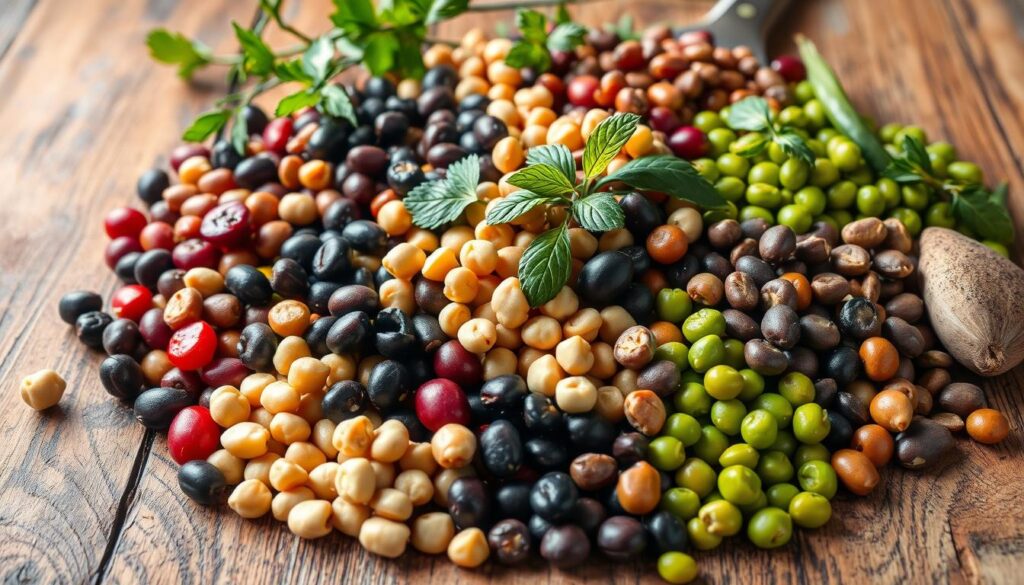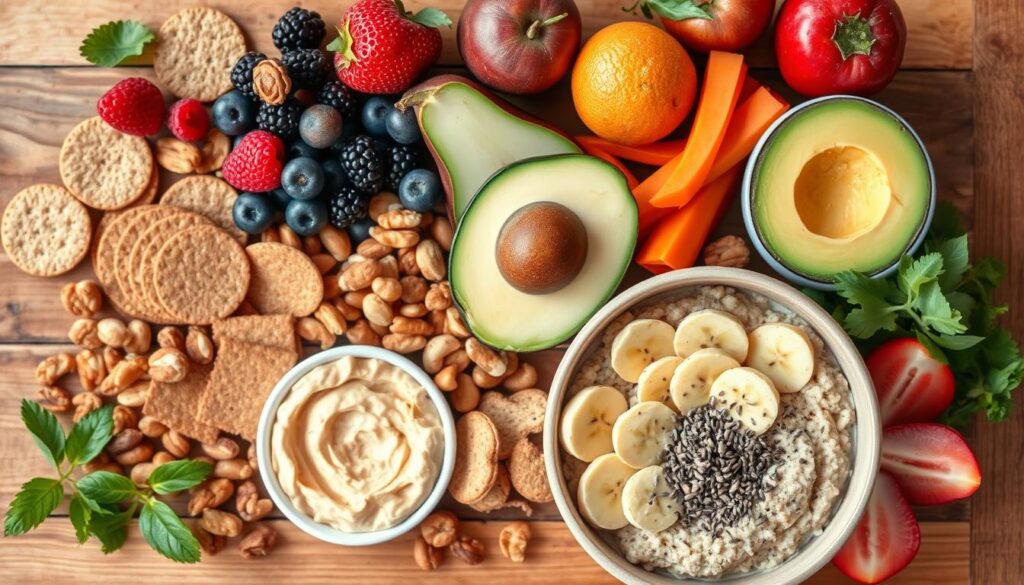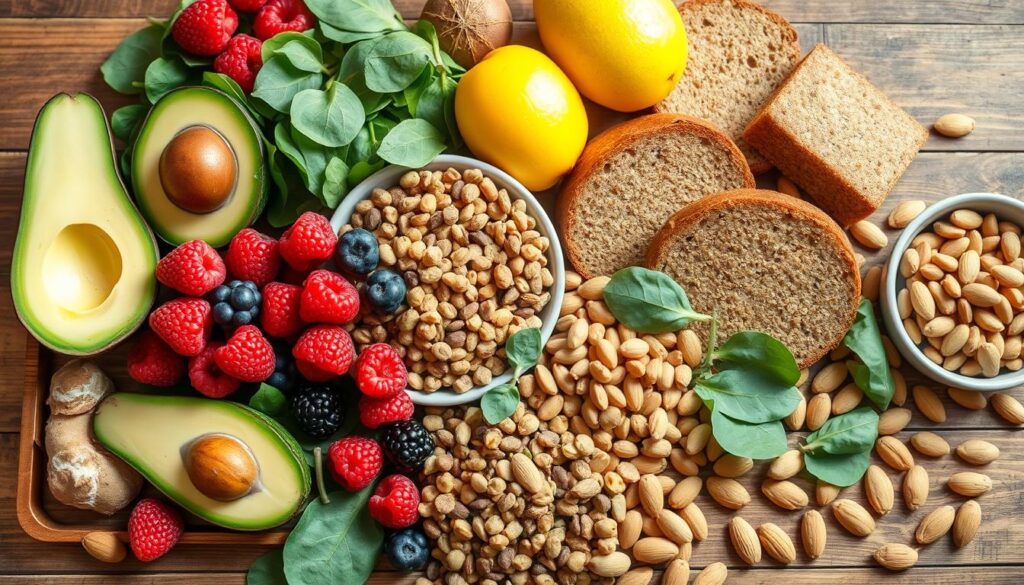Pregnancy is a special time, but it can also have its challenges. Like constipation, which affects up to 39% of pregnant women in the first and second trimesters. Eating foods high in fiber is key to help your body and keep you feeling good.
Fiber is important for digestion, blood sugar, and feeling full. Doctors say pregnant women should eat 28 to 35 grams of fiber each day. Eating foods rich in fiber can help you meet this goal and ease pregnancy discomforts.
Key Takeaways
- Fiber is essential for pregnant women to prevent constipation and support overall digestive health.
- Experts recommend 28-35 grams of fiber per day during pregnancy.
- High-fiber foods include fruits, vegetables, whole grains, legumes, nuts, and seeds.
- Soluble fiber helps control blood sugar and cholesterol, while insoluble fiber adds bulk to the stool.
- Gradually increasing fiber intake and staying hydrated can help minimize potential side effects like gas and bloating.
Understanding Fiber’s Role During Pregnancy
Dietary fiber is very important for your health when you’re pregnant. There are two kinds: soluble and insoluble fiber. Each kind has special benefits for moms-to-be.
Soluble vs. Insoluble Fiber During Pregnancy
Soluble fiber dissolves in water and helps control blood sugar. Insoluble fiber makes your stool bulkier, helping you go to the bathroom regularly. Both are key for a healthy pregnancy.
Daily Fiber Requirements for Expecting Mothers
Pregnant women need 30-35 grams of fiber every day. This is more than the usual 30 grams for adults. Your body needs more fiber to support your baby and deal with pregnancy issues like constipation.
Benefits of Dietary Fiber While Pregnant
Eating enough prenatal dietary fiber intake has many benefits. These include:
- Improved bowel function and regularity
- Regulated blood sugar levels
- Lower cholesterol
- Healthy weight management
- Support for gut health and immune function
By getting enough fiber requirements during gestation, you can have a comfortable and healthy pregnancy. This is good for you and your baby.
“Adequate fiber intake during pregnancy can help lower the risk of diabetes, preeclampsia, and constipation.”
Why Constipation Occurs During Pregnancy
Constipation is a common problem for many pregnant women. It happens due to hormonal changes, iron supplements, and physical changes. These include the growing uterus and less activity.
As you get closer to your due date, your body makes more progesterone. This hormone slows down your intestines. The growing uterus also puts pressure on your bowels. Iron supplements can make constipation worse.
- Approximately 11% to 38% of pregnant women experience constipation.
- Constipation is the second most common gastrointestinal complaint during pregnancy, following nausea.
- Rising progesterone levels and reduced motilin hormone levels lead to increased bowel transit time during pregnancy.
- An enlarging uterus in later pregnancy can slow the movement of feces.
Symptoms of constipation include hard stools and painful bowel movements. It’s important to know it doesn’t harm your baby.
To fight constipation, eat foods high in fiber and drink lots of water. Exercise regularly too. If these steps don’t help, your doctor might suggest fiber supplements or laxatives. These are safe during pregnancy.
“Constipation is a common complaint during pregnancy, but it can be effectively managed through dietary and lifestyle changes.”
High Fiber Food for Pregnancy: Essential Guide
Eating foods high in fiber is key when you’re pregnant. It helps keep you and your baby healthy. Adding the best high-fiber foods to your diet is a smart move.
Fruits Rich in Fiber
There are many tasty fruits full of fiber. They’re great for your pregnancy diet. Here are some top picks:
- Apples (4g of fiber per fruit)
- Blueberries (2.4g of fiber per cup)
- Prunes (7.1g of fiber each)
Fiber-Packed Vegetables
Vegetables are also full of fiber. They help with digestion and regular bowel movements during pregnancy. Try these high-fiber veggies:
- Sweet potatoes (6g of fiber per large baked potato)
- Kale (4.75g of fiber per cup, boiled)
- Brussels sprouts (6g of fiber per cup, cooked)
Whole Grain Options
Whole grains are a great way to get more fiber. They’re good for you and your baby. Here are some fiber-rich whole grains:
- Brown rice (3g of fiber per cup, cooked)
- Steel-cut oats (8g of fiber per half cup)
By eating these high-fiber foods, you and your baby will stay healthy. It’s a win-win for everyone.
Legumes and Beans: Superior Fiber Sources
Legumes and beans are great for fiber during pregnancy. They are full of fiber, which is good for you. They are key to a high-fiber diet while expecting.
Chickpeas are a great choice. One cup has 12.5 grams of fiber. That’s almost half what pregnant women need. You can eat them in soups, salads, or roasted as a snack.
Black beans are also rich in fiber. One cup has about 15 grams of fiber and lots of protein. They are good in many dishes, like chilis and rice bowls.
- Chickpeas provide 12.5g of fiber per cup and are highly versatile
- Black beans offer around 15g of fiber per cup and are rich in protein
- Legumes and beans can be enjoyed in soups, stews, salads, and more
Eating more legumes and beans helps you get more fiber. This is good for your health and your baby’s growth. They help with digestion and keep you feeling good.

“Incorporating more fiber-rich legumes and beans into your pregnancy diet is a simple and delicious way to support your body and your baby’s development.”
Nuts and Seeds for Fiber Intake
As an expectant mom, getting enough fiber is key for a healthy pregnancy. Nuts and seeds are great for this. They’re full of fiber and other good stuff like healthy fats and minerals.
Best Nuts for Pregnancy Nutrition
Some nuts are better than others for fiber. Walnuts have 8 grams of fiber per cup. Almonds have 18 grams per cup. You can eat them alone, add them to salads, or mix them into trail mixes.
Seed Options for Extra Fiber
Seeds are also great for fiber. Chia seeds have 10 grams of fiber in just 2 tablespoons. You can add them to yogurt or smoothies. Flaxseeds have 7.8 grams of fiber per 2 tablespoons.
Adding nuts and seeds to your diet helps meet your fiber needs. Try different mixes and find fun ways to add them to your food.
| Nut/Seed | Fiber Content (per 1 oz serving) | Percentage of Daily Fiber Requirement |
|---|---|---|
| Walnuts | 2 grams | 6.7% |
| Almonds | 4 grams | 13.3% |
| Chia Seeds | 5 grams | 16.7% |
| Flaxseeds | 3.9 grams | 13% |
Pregnant women need 30g of fiber a day. Eating nuts and seeds can help you get there and support a healthy pregnancy.
Smart Snacking with Fiber-Rich Foods
Being pregnant means you need a diet full of fiber. Fiber-rich snacks help with constipation and give you energy. They also give your baby the nutrients they need. Let’s look at some good snacks for you and your baby.
Roasted chickpeas are a great snack, with 8 grams of fiber. Dry roasted edamame has 6 grams of fiber per pouch. Chia seed squeeze snacks are tasty and full of fiber, protein, and healthy fats.
Pregnant women need 28-30 grams of fiber every day. Fiber helps control blood sugar and keeps you full. This helps you stay healthy and avoid cravings.
- Roasted chickpeas (8g fiber per serving)
- Dry roasted edamame (6g fiber per pouch)
- Chia seed squeeze snacks
Start eating more fiber slowly and drink lots of water. These snacks are good for you and your baby. Enjoy the benefits they bring.

Tips for Increasing Fiber Intake Safely
When you’re pregnant, it’s important to add fiber to your diet carefully. Fiber helps your digestion and keeps you regular. But, you should add it slowly to avoid feeling uncomfortable.
Start with a little bit of fiber each day. Then, slowly add more over time. This lets your body get used to it.
Gradual Integration Methods
Start by adding one high-fiber food at a time. Try adding oats or lentils to your breakfast. Or, snack on nuts and seeds.
As you get used to it, you can eat more. Or, try other high-fiber foods in your meals and snacks.
Hydration Requirements
Drinking enough water is key when you’re eating more fiber. Try to drink 8-10 glasses of water a day. This helps fiber move through your body well.
It stops problems like bloating, gas, or constipation. These can happen if you eat too much fiber too fast.
By following these tips for safe fiber intake during pregnancy, you can enjoy fiber’s benefits. These pregnancy nutrition tips will help you stay healthy and comfortable.
Common Mistakes When Adding Fiber to Pregnancy Diet
When you want to add more fiber to your diet while pregnant, do it slowly. Many moms-to-be increase fiber too fast. This can cause bloating, gas, and discomfort.
Don’t just take fiber supplements. Instead, eat foods that are full of fiber like fruits, veggies, whole grains, legumes, and nuts. Start slow to help your body adjust. Also, drink lots of water to help your body digest more fiber.
Talk to your healthcare provider before changing your diet. They can help you make good choices. With their help, you can enjoy the benefits of more fiber without feeling bad.


A Life-Changing Experience with This Weight Loss Supplement (Nagano Tonic)
I’ve always struggled with finding a weight loss solution that actually works for me. Like many, I’ve tried numerous diets, exercise routines, and supplements over the years—some worked for a short time, but nothing ever gave me long-term results. That was until I decided to try the weight loss supplement I found : Link to the Supplement.
From the moment I started using it, I noticed a difference. Not only did I feel more energized, but my cravings also became more manageable. The best part? I started seeing results much quicker than I anticipated! Over the course of just a few weeks, I noticed a significant reduction in belly fat and overall weight loss that I hadn’t been able to achieve before.
What makes this supplement stand out from all the others I’ve tried is how it supports me in my daily routine without any jitters or energy crashes. I’m able to stay focused and motivated, which has made it easier to stay on track with my diet and exercise plan.
This product truly exceeded my expectations, and I feel more confident and healthier than ever before. If you’re struggling with your weight loss journey like I was, I highly recommend giving this supplement a try. It’s been a game-changer for me, and I’m sure it can work wonders for you too!
Contant Them on email .. tonicnagano50@gmail.com
I’ve tried so many weight loss products over the years, but nothing worked like this supplement! Since I started using it, I’ve noticed a big difference in my energy levels and appetite control. In just a few weeks, I’ve lost weight and feel so much better. It’s been easy to stick with, and the results speak for themselves. Highly recommend this to anyone looking to make a real change!
wasn’t sure what to expect, but this weight loss supplement has really impressed me! After just a few weeks of use, I’ve already dropped a few pounds and feel more motivated to stay active. It’s helped curb my cravings and boosted my energy throughout the day. I’m excited to keep going and see even better results. Definitely worth trying!
Reach them on tonicnagano50@gmail.com
I was skeptical at first, but this supplement has truly made a difference in my weight loss journey. I’ve lost weight without feeling deprived or sluggish. My cravings are under control, and I feel more confident in my body. It’s easy to incorporate into my daily routine, and the results speak for themselves. I’m so glad I gave it a try!
Thanks David, i do use the link to make my purchase. you can get too here http://surl.li/iasppy
I’ve tried so many weight loss products, but this one has been by far the most effective. In just a few weeks, I’ve noticed a visible difference in my body and energy levels. It’s helped me stay on track without the constant hunger pangs and cravings. I’m really happy with my progress and can’t wait to see where I’ll be in another month!
This Nagano Tonic has been amazing! In just a few weeks, I’ve lost weight, feel more energized, and my cravings are under control. Highly recommend it!
Thats the link to purchase http://surl.li/iasppy